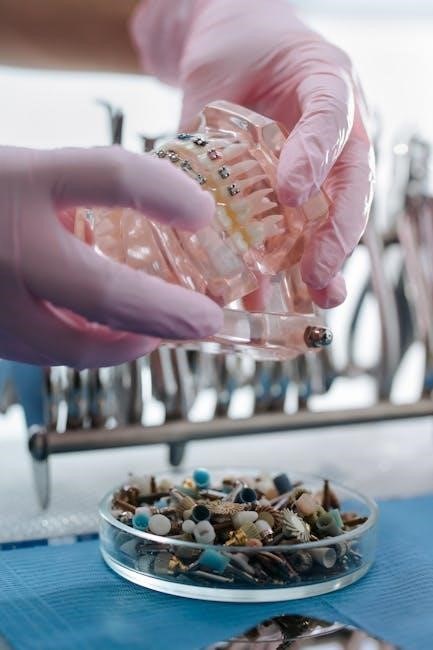Immediate Post-Surgery Care
After surgery, rest and hydration are crucial. Nausea is normal due to sedation. A driver must be present to assist you home. Avoid smoking and alcohol temporarily to promote healing and prevent complications. Monitoring for bleeding and swelling is essential during the initial recovery period.
Importance of Rest and Hydration
Rest is essential immediately after implant surgery to promote healing and reduce discomfort. Avoid strenuous activities and ensure a calm environment. Hydration is critical to prevent dehydration and support recovery. Drink plenty of fluids, such as water or clear broths, starting the day of surgery. Nausea is common due to sedation, so sip liquids slowly. A driver should accompany you home to ensure safety. Proper rest and hydration help minimize swelling and bleeding, aiding the body in recovering effectively. Avoid smoking and alcohol temporarily, as they can disrupt healing. Prioritizing rest and staying hydrated will significantly contribute to a smooth recovery process.
Managing Swelling and Bruising
Swelling and bruising are common after implant surgery and typically subside within a few days. To manage swelling, apply an ice pack to the surgical area for 15-20 minutes at a time, repeating as needed during the first 24 hours. Keep your head elevated while resting to reduce swelling. Bruising may appear around the jaw or cheeks but will fade gradually. Avoid strenuous activities that could worsen swelling. Monitor for excessive swelling or discoloration, as these could indicate complications. If swelling persists beyond a week, contact your dentist or surgeon for evaluation. Proper care and monitoring will help minimize these temporary effects.
Monitoring for Bleeding and Complications
Monitor the surgical site for bleeding, which is normal but should be controlled with gauze as instructed. If bleeding persists or becomes heavy, contact your dentist. Watch for signs of complications, such as excessive swelling, severe pain, or redness, which may indicate infection. Pus or discharge around the implant site is a concern and requires immediate attention. If you experience numbness, tingling, or a loose implant, notify your dentist promptly. Keep track of your healing progress and report any unusual symptoms. Early detection of complications ensures timely intervention and prevents long-term issues. Stay vigilant during the first week to ensure proper healing.

Pain Management and Discomfort
Discomfort and swelling are normal after implant surgery. Use prescribed pain medication as directed to manage soreness. Rest and avoid strenuous activities to aid recovery. Follow post-op instructions for pain relief and monitor discomfort levels, seeking help if pain becomes severe or persistent.
Recommended Medications and Dosage
Prescribed pain medications or over-the-counter options like ibuprofen or acetaminophen are typically recommended to manage discomfort. Always follow the dosage instructions provided by your dentist or surgeon. Start with a low dose and adjust as needed, ensuring not to exceed the maximum daily limit. For severe pain, stronger medications may be prescribed temporarily. Nausea from sedation can also be managed with anti-nausea medication if needed. Monitor your pain levels and adjust your medication use accordingly, while avoiding alcohol and smoking to promote healing. If pain persists or worsens, contact your dentist for further guidance;
Normalizing Discomfort and Expected Sensations
After implant surgery, mild discomfort, tenderness, and swelling are normal sensations. These typically subside within a few days. Patients may experience bruising or numbness around the surgical site, which is temporary. Aching or tightness in the jaw is also common as the implant integrates with the bone. Light bleeding or pinkish saliva may occur but should decrease within 24-48 hours. It’s important to rest and avoid strenuous activities to allow the body to heal. Pain levels vary, but most patients find over-the-counter pain relievers sufficient. If discomfort worsens or persists, contact your dentist to rule out complications. Proper healing requires patience and adherence to post-operative instructions.

Dietary Restrictions and Nutrition
Stick to soft foods like yogurt, mashed potatoes, and soups for the first 24-48 hours. Avoid hard, crunchy, or spicy foods to protect the implant site. Gradually return to a balanced diet, ensuring proper nutrition for healing. Stay hydrated with water and avoid alcohol or hot beverages initially.
Soft Food Recommendations for the First 24-48 Hours
After implant surgery, prioritize soft, non-irritating foods to minimize discomfort and protect the surgical site. Opt for foods like yogurt, scrambled eggs, mashed potatoes, and soft-cooked soups; Avoid hard, crunchy, or spicy foods that could dislodge the blood clot or irritate the gums. Smoothies and pureed fruits or vegetables are also excellent choices. Stay hydrated with water or clear broths, but avoid using a straw to prevent dislodging the clot. Cold or lukewarm foods can help reduce swelling and discomfort. Avoid alcohol and hot beverages for the first 48 hours. Gradually introduce softer versions of your regular diet as healing progresses.
Gradual Transition to a Regular Diet
After the initial 24-48 hours, you can gradually introduce softer versions of your regular diet. Start with soft solids like tender meats, fish, and steamed vegetables. Chop food into small, manageable pieces to avoid discomfort. Avoid hard, crunchy, or sticky foods that could disrupt the healing process. Continue to prioritize gentle chewing and avoid biting directly on the implant site. As comfort improves, you can slowly reintroduce more textured foods. However, steer clear of nuts, chips, and tough meats until fully healed. Listen to your body and adjust your diet based on comfort levels. Proper nutrition supports healing, but patience is key during this transition.

Oral Hygiene and Wound Care
Keep the implant site clean with gentle rinses and soft brushing. Avoid disrupting the healing cap. Use saltwater rinses to promote healing and reduce bacteria growth.
Gentle Cleaning Techniques Around the Implant Site
Use a soft-bristled toothbrush to clean the implant site gently, avoiding direct pressure. Rinse with saltwater solution (1 teaspoon salt in 8 ounces of warm water) 2-3 times daily, starting 24 hours post-surgery. Avoid harsh mouthwashes or abrasive products. Do not spit or rinse forcefully, as this may dislodge the blood clot. Gently clean around the healing cap or implant without scrubbing. Maintain oral hygiene to prevent bacteria buildup, but avoid over-aggressive cleaning that could disrupt healing. These techniques ensure the implant site remains clean while promoting proper healing and minimizing the risk of complications.
Importance of Maintaining Oral Hygiene
Maintaining proper oral hygiene is critical for healing and long-term success of dental implants. Poor hygiene can lead to infections or implant failure. Use a soft-bristled toothbrush to clean teeth gently, avoiding direct pressure on the implant site. Saltwater rinses (1 teaspoon salt in 8 ounces of warm water) can help reduce bacteria and promote healing. Avoid using harsh mouthwashes or abrasive products that may irritate the surgical area. Consistent oral care prevents plaque buildup and supports a healthy environment for implant integration. Proper hygiene habits ensure optimal recovery and minimize the risk of complications, contributing to the overall success of your dental implant procedure.

Activity Restrictions and Lifestyle Adjustments
Avoid strenuous activities, heavy lifting, and bending for 24-48 hours post-surgery. Rest is essential for healing. Smoking and alcohol should be avoided to prevent complications and promote recovery.
Avoiding Strenuous Activities and Heavy Lifting
It is crucial to avoid strenuous activities and heavy lifting for at least 24-48 hours after surgery. Rest is essential for proper healing and to prevent complications. Activities like bending or lifting heavy objects can dislodge the blood clot or disrupt the implant placement. Even light exercise should be avoided during this period, as it may increase swelling or discomfort. Patients should focus on relaxation and avoid any tasks that strain the body. Gradually resuming normal activities is recommended only after a few days, provided there are no signs of complications. Always follow your dentist’s specific guidance for a smooth recovery.
Smoking and Alcohol Consumption Guidelines
Smoking and alcohol consumption must be avoided during the initial healing period after dental implant surgery. Smoking can significantly slow down healing, reduce blood flow, and increase the risk of complications. It is recommended to avoid smoking for at least 10 days post-surgery. Alcohol consumption should also be avoided for 48 hours, as it can interfere with blood clot formation and prolong recovery. Both habits can impair the body’s ability to heal properly, potentially leading to implant failure or infection. Following these guidelines is essential for ensuring a smooth and successful recovery. Adhering to your dentist’s advice will help minimize risks and promote optimal healing outcomes.

Follow-Up Care and Appointments
Attending scheduled follow-up visits is crucial for monitoring healing progress and ensuring implant success. Regular check-ups allow your dentist to assess integration and make necessary adjustments promptly.
Importance of Attending Scheduled Follow-Up Visits
Attending scheduled follow-up visits is essential for ensuring proper healing and implant success. These appointments allow your dentist to monitor the implant’s integration with the jawbone, assess tissue healing, and address any potential issues early. Regular check-ups help prevent complications such as infection or implant failure. Your dentist will also evaluate the implant’s stability and make necessary adjustments to ensure optimal results. Missing follow-up visits can lead to unresolved problems, affecting the long-term success of your dental implant. By adhering to the recommended schedule, you ensure a smooth recovery and maintain your oral health.
Monitoring Healing Progress and Adjustments
Monitoring healing progress is vital to ensure the implant successfully integrates with your jawbone. Your dentist will schedule follow-ups to assess the implant’s stability and tissue healing. Adjustments may be necessary to ensure proper alignment or address any complications. Signs of infection, persistent swelling, or unusual discomfort should be reported immediately. Regular X-rays may be taken to evaluate the implant’s position and bone integration. Proper healing ensures long-term functionality and aesthetics of the implant. Any delays in healing or unexpected issues can be addressed early, preventing more severe problems. Consistent monitoring ensures the best possible outcome for your dental implant procedure.

Emergency Situations and Complications
Recognize signs of infection, severe pain, or excessive bleeding. Contact your dentist immediately if healing is delayed or unusual symptoms arise. Prompt action prevents complications like implant failure or infection.
Recognizing Signs of Infection or Failure
Monitor for signs of infection, such as redness, swelling, or pus around the implant site. Persistent pain beyond the expected recovery period or increased sensitivity may indicate complications. Watch for unusual bleeding, fever, or chills, as these could signal infection. If the implant feels loose or unstable, it may be failing to integrate properly. Contact your dentist immediately if you notice any of these symptoms. Early intervention is crucial to address issues before they worsen. Prompt action can prevent infection spread or implant failure, ensuring a successful recovery and long-term results.
When to Contact Your Dentist or Surgeon
Contact your dentist or surgeon immediately if you experience heavy bleeding that doesn’t stop with pressure, severe pain, or swelling that worsens. Seek help if you notice unusual discharge, fever, or chills, as these may indicate infection. If the implant feels loose or unstable, or if you have numbness, tingling, or persistent bad taste, reach out. Report any signs of failure or complications promptly to ensure proper evaluation and treatment. Early intervention can prevent serious issues and ensure the success of your dental implant procedure.
